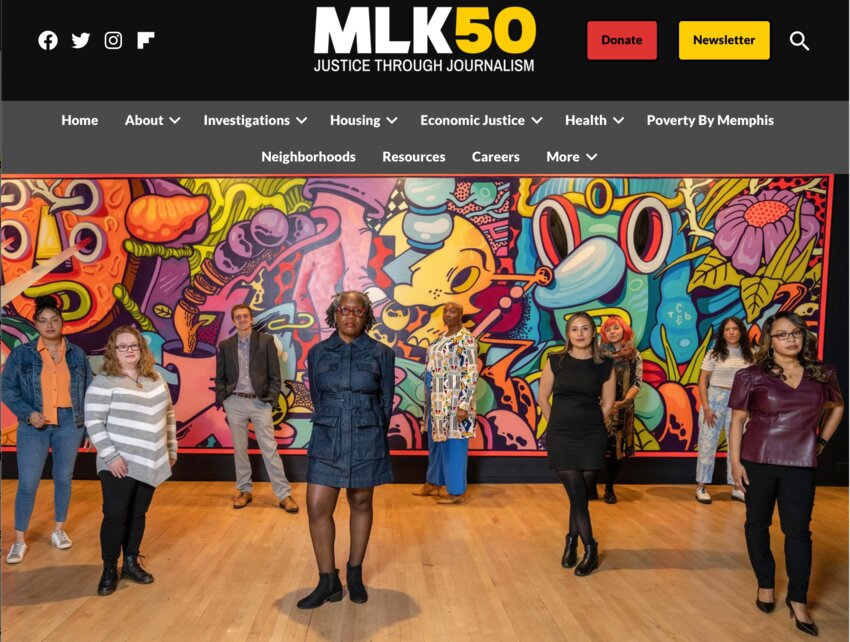“Justice through journalism” is MLK50’s mission. Celebrating seven years in Memphis, Tennessee, the nonprofit newsroom honors Dr. Martin Luther King Jr.’s legacy, courageously producing journalism for the city’s marginalized communities.
Wendi C. Thomas is MLK50’s editor, publisher and founder. “I wasn’t born in Memphis, but I grew up here, so I spent more time, probably, than most kids thinking about Dr. King,” she said.
Thomas was the managing editor for The Commercial Appeal, a daily newspaper in Memphis, when she coordinated coverage of the 40th anniversary of Dr. King’s assassination. She began thinking ahead about how best to report on the 50th anniversary to come a decade later.
“When I was at The Commercial Appeal, there was not another Black women Metro columnist until I was in the role. … It speaks to how few opportunities Black women got in a city that’s been majority Black for decades,” she said.
After 11 years at the newspaper, Thomas found the job untenable.
“The short version is that racist readers kept threatening me,” she said. She reached her breaking point at the paper when one of those readers threatened to rape her, and she didn’t feel that leadership at the paper took the threats seriously. “I decided I could no longer work there because I did not feel safe.”
She seized the opportunity to apply for a 2016 Nieman Foundation for Journalism Fellowship at Harvard University and kept thinking about how to make an impact back at home in Memphis.
Thomas launched MLK50 in April 2017.
“We started so small and with so little money that we didn’t even have a branding campaign,” she recalled. She had a loyal social media following from her years at the daily, so she tapped into that audience.
“People ask, ‘Who are you writing this for?’ And we’re definitely not trying to be the daily newspaper. We like to think we’re connecting with the people who Dr. King would be aligned with if still alive — anybody who has been marginalized, people of color, particularly Black people,” Thomas explained.
“We’re here to dismantle the status quo,” she added.

MLK50 expressly reports on poverty, power and policy. Solutions journalism is integral to their model. For example, Jacob Steimer, who covers house and development, compiled resources for people facing eviction or having difficulty compelling landlords to fix problems and maintain buildings.
“Jacob has gone to eviction court to give people in the hallways these resources. He watched them as they appeared in court and used language they learned from the sheet. Talk about immediate impact,” Thomas said. “If we’re not making a difference in people’s lives in a way that can be measured, literally, what’s the point?”
MLK50 publishes the names of donors who give more than $5,000. She said that donors — especially the largest ones — demand to see that impact. Many come from outside of Memphis.
“The South, as a whole, and Memphis, in particular, doesn’t have a lot of philanthropy. There are not a lot of super-large foundations giving away tens of millions of dollars every year, and some of the foundations that do are narrowly focused on things like the arts or Christian education. They’re not in the journalism space,” she explained.
“National philanthropy will always be a very large part of our funding mix,” she said.
The funding they garnered was hard-fought and took a long time to come.
Thomas recounted how she lived off credit, accruing debilitating debt while she got MLK50 off the ground.
“It cost me physically, psychologically and emotionally. It was no joke,” she said. “I have cut years off my life by attempting to be a news media entrepreneur.”
Thomas’ initial appeals for funding were unfruitful. She was told the startup was “too risky.” She remarked on the disparity in news philanthropy — other news startups receiving investment based on an idea, a promise or potential.
“With Black folk, they want proof,” she said. It wasn’t until a 2019 partnership with ProPublica, which investigated Methodist Le Bonheur Healthcare, that philanthropic organizations reconsidered investment.
“I couldn’t get the money until I had done that groundbreaking investigation with ProPublica, which led to $12 billion in patient debt being erased and an overhaul of charity care policies that will outlive me and dramatically change people’s lives,” she said.
Though her career in journalism was award-winning and exemplary, it took that partnership to compel investment.
“It speaks to some people’s inability to imagine that a Black woman down in Memphis could actually know what she’s doing and end up being good at it. Success is the best revenge,” she said.
Thomas said that at the end of Q4 2023, MLK50 had approximately $2 million in the bank and was still growing — in staff, coverage and new ventures, like events. Last November, they held a game-night fundraiser with a Spades card tournament, music and food. Thomas has moderated a panel on public safety for the community and sponsored an author’s forum with Matt Desmond at Rhodes College. They hope to roll out mobile newsrooms in the year ahead to solicit tips from the public and build trust.
“Journalism can be very transactional. For example, you might meet someone who tells you about their new business. You write it up and publish it, and they never hear from you again. So, how can we disrupt that pattern and build connections,” she pondered.
Being visible and useful helped the newsroom and audience grow.
“We have definitely turned a corner at MLK50 and are very lucky and blessed, but it’s also thanks to our hard work,” she said.
MLK50’s team is accomplished and diverse. In addition to Thomas and Steimer, there’s Adrienne Johnson Martin, executive editor; Andrea Morales, visuals editor; Melonee Gaines, audience engagement manager; Lupita Parra, development director; Andrea Faye Hart, chief strategy officer; and Stephanie Wilson, digital editor. Reporter Katherine Burgess covers government accountability, and Sono Motoyama is MLK50’s science writer. They hope to add a reporter to cover juvenile justice and Memphis youth.
“It was very important to me to have a team that looks like the community we serve,” she said.
Access has been a challenge. Thomas engaged a lawyer with the Reporters Committee for Freedom of the Press when a local judge defied Tennessee’s Open Meetings Act and prevented her from reporting on court proceedings. The city’s former mayor was notorious for impeding the press. “Jim Strickland’s administration was an abomination for media access. He just shut us out,” she said.
Thomas said she’s hopeful the new mayor will be more transparent. “But just yesterday, he was getting heat over his police chief and declined to comment to a reporter about it. I thought, ‘Oh, here we go,’” she said.
Reflecting on MLK50’s first seven years and its legacy, Thomas said, “Success, for me, looks like making a measurable, tangible difference in people’s lives.”
 Gretchen A. Peck is a contributing editor to Editor & Publisher. She’s reported for E&P since 2010 and welcomes comments at gretchenapeck@gmail.com.
Gretchen A. Peck is a contributing editor to Editor & Publisher. She’s reported for E&P since 2010 and welcomes comments at gretchenapeck@gmail.com.
Comments
No comments on this item Please log in to comment by clicking here